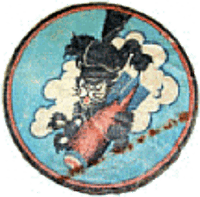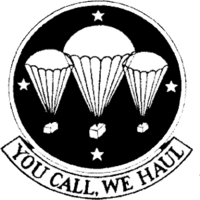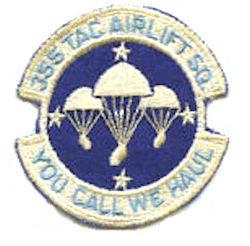355th Tactical Airlift Squadron
| 355th Tactical Airlift Squadron | |
|---|---|
|
Emblem of the 355th Tactical Airlift Squadron | |
| Active | 1942-1969 |
| Country | United States |
| Branch | United States Army Air Forces |
| Type | Bombardment |


The 355th Tactical Airlift Squadron is an inactive United States Air Force unit. Its last assignment was with 906th Tactical Airlift Group stationed at Rickenbacker Air National Guard Base, Ohio. It was inactivated on 1 July 1982.
History
Activated in early 1942 as a B-24 Liberator Operational Training Unit (OTU), later becoming a Replacement Training Unit (RTU) for deployed combat units, assigned to II Bomber Command. Inactivated in April 1944 when heavy bomber training ended.
Re-dgesignated as a B-29 Superfortress very heavy bombardment Squadron under Second Air Force 1 April 1944 at Dalhart Army Airfield, Texas. Initially equipped with B-17 Flying Fortresses for training, due to shortage of B-29 Superfortresses. Moved to Harvard Army Airfield, Nebraska, in August 1944 and equipped with B-29B limited production aircraft.
After completion of training deployed to Central Pacific Area (CPA), assigned to XXI Bomber Command, Northwest Field (Guam) for operational missions. B-29Bs were standard production aircraft stripped of most defensive guns to increase speed and bomb load, The tail gun was aimed and fired automatically by the new AN/APG-15B radar fire control system that detected the approaching enemy plane and made all the necessary calculations.
Mission of the squadron was the strategic bombardment of the Japanese Home Islands. Dntered combat on 16 June 1945 with a bombing raid against an airfield on Moen. Flew first mission against the Japanese home islands on 26 June 1945 and afterwards operated principally against the enemy's petroleum industry. Flew primarily low-level, fast attacks at night using a mixture of high-explosive and incendary bombs to attack targets.
Flew last combat mission on 15 August 1945, later flew in "Show of Force" mission on 2 September 1945 over Tokyo Bay during formal Japanese Surrender. Inactivated on Guam 15 April 1946, personnel returned to the United States and aircraft sent to storage in Southwest United States.
It trained for C-54 airlift operations from 1949–1950 and for troop carrier missions from 1952-1959. Reactivated in 1963 to organize, recruit and train Air Force Reserve personnel to provide tactical airlift of airborne forces, their equipment and supplies and delivery of these forces and materials by airdrop, landing or cargo extraction systems. Initially equipped with C-119 Flying Boxcars for Tactical Air Command airlift operations.
Replaced C-119s with C-123 Provider assault transport in 1967, began training with special operations forces when parent 302d Tactical Airlift Wing was redesignated as a Special Operations Wing in 1970. Inactivated in 1975 as part of post-Vietnam War drawdown.
Reactivated in 1981 as a UC-123K Provider reserve squadron at Rickenbacker ANGB, Ohio for aireal spraying operations. Inactivated in 1982 when host unit was realigned into a fighter group at Wright-Patterson AFB.
Operations and Decorations
- Combat Operations: Combat in Western Pacific, 23 Jun-14 Aug 1945.
- Campaigns: Air Offensive; Japan; Eastern Mandates; Western Pacific.
- Decorations: Distinguished Unit Citation, Japan 6-13 Jul 1945
Lineage
- Constituted 355 Bombardment Squadron (Heavy) on 28 Jan 1942
- Activated on 1 Jun 1942
- Inactivated on 10 Apr 1944
- Redesignated 355 Bombardment Squadron, Very Heavy on 27 Jun 1944
- Activated on 7 Jul 1944
- Inactivated on 15 Apr 1946
- Redesignated 355th Troop Carrier Squadron (Medium) on 16 May 1949.
- Activated in the reserve on 27 Jun 1949.
- Redesignated 355th Troop Carrier Squadron (Heavy) on 28 Jan 1950
- Ordered to active service on 1 Jun 1951.
- Inactivated on 8 Jun 1951
- Redesignated 355th Troop Carrier Squadron (Medium) on 26 May 1952
- Activated in the reserve on 14 Jun 1952
- Inactivated on 14 April 1959
- Reactivated on 15 January 1963
- Re-designated 355th Tactical Airlift Squadron, on 1 Jul 1967
- Inactivated on 1 Sep 1975
- Reactivated on 1 April 1981
- Inactivated on 1 July 1982
Assignments
- 302d Bombardment Group, 1 Jun 1942-10 Apr 194
- 331st Bombardment Group, 7 Jul 1944-15 Apr 1946
- 302d Troop Carrier Group, 27 Jun 1949-8 Jun 1951; 14 Jun 1952-14 April 1959
- 906th Troop Carrier (later Tactical Airlift) Group, 11 Feb 1963-1 Sep 1975
- 906th Tactical Airlift Group, 1 April 1981 – 1 July 1982
Stations
|
|
Aircraft
|
|
References
![]() This article incorporates public domain material from the Air Force Historical Research Agency website http://www.afhra.af.mil/.
This article incorporates public domain material from the Air Force Historical Research Agency website http://www.afhra.af.mil/.
- Maurer, Maurer, ed. (1983) [1961]. Air Force Combat Units of World War II (PDF) (reprint ed.). Washington, DC: Office of Air Force History. ISBN 0-912799-02-1. LCCN 61060979.
- Maurer, Maurer, ed. (1982) [1969]. Combat Squadrons of the Air Force, World War II (PDF) (reprint ed.). Washington, DC: Office of Air Force History. ISBN 0-405-12194-6. LCCN 70605402. OCLC 72556.
- Rogers, Brian (2005). United States Air Force Unit Designations Since 1978. Hinkley, England: Midland Publications. ISBN 1-85780-197-0.
